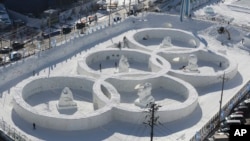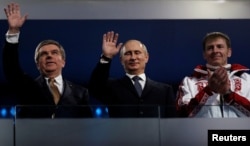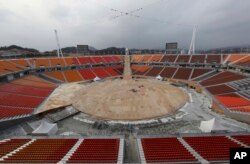Russian President Vladimir Putin says Russia will not prevent its athletes from competing in the 2018 Olympics, after the International Olympic Committee banned the Russian team from the games over doping allegations.
Though Russian Olympians will not be allowed to compete under their flag, Putin said that he will not prevent athletes from competing in a "personal capacity" in the upcoming Winter Games in Pyeongchang, South Korea.
The IOC ruled Tuesday individual Russians may still compete as an "Olympic Athlete from Russia."
WATCH: Russia Olympics ban
The long-awaited IOC decision punishing Russia for a state-sponsored doping campaign during the 2014 Olympics in Sochi, Russia, came a little more than two months before the quadrennial skiing, skating and sledding contests unfold at venues in the mountains and along the coast of South Korea.
Speaking to reporters after a speech to automobile plant workers in Nizhny Novgorod where he announced he would run for a fourth presidential term next year, Putin said the IOC decision was politically motivated.
"It all looks like an absolutely orchestrated and politically-motivated decision ... We all see this, for me there is no doubt about it," he said.
In addition to the 2018 ban for Russia's representation as a country, the IOC fined the Russian Olympic Committee $15 million and suspended its president, Alexander Zhukov, as an IOC member.
Zhukov told the French news agency AFP he "apologized" to the IOC on Tuesday for the "anti-doping violations" committed in his country in recent years.
'Russian athletes'
He said including the word "Russia" in the team name was a key issue. "They'll be called Russian athletes and not some kind of neutrals ... that's very important," he added.
The games will not be broadcast in the country because of the absence of a Russian national team. Russian President Vladimir Putin has previously said that it would be humiliating for his country to compete without national symbols.
Russia could refuse the offer to let its athletes compete without national identity or the playing of the Russian national anthem.
Infographic: Who are the world doping champions? (Click here to see)
But IOC President Thomas Bach said, "An Olympic boycott has never achieved anything. Secondly, I don't see any reason for a boycott by the Russian athletes because we allow the clean athletes there to participate."
However, Pyotr Tolstoy, deputy speaker of the State Duma, the Russian parliament's lower house, has called for a boycott. "They are humiliating the whole of Russia through the absence of its flag and anthem," he said in televised remarks.
Alexander Zubkov, president of Russia's Bobsleigh Federation, told Russian TV that the IOC decision was a "humiliation. ... a punch in the stomach."
Alexei Kravtsov, president of the Russian Skating Union, said: "The decision is offensive, insulting and completely unjustified. ... I consider that this decision will deal a great blow to the whole Olympic movement."
Slava Malamud, a U.S.-based contributor to the Russian language Sovetsky Sport newspaper, which is headquartered in Moscow, said the IOC ban is unlikely to change Russia's approach to Olympic competition.
"Punishment usually assumes that we have done something wrong, hence we have to change something," he told VOA Russian, referring to the IOC ban. "But I don't think anything will change. For example, I don't think that [Russian Deputy Prime Minister Vitaly] Mutko, who has created and implemented this system, will pay somehow for it. ... And I also don't think someone in Russia will say, 'Hey, we got carried away with our games here. We have to change our world outlook. We shouldn't be thinking that winning at any price shows the greatness of our motherland, but we rather have to think of fairness in sports.'"
Stripped of medals
The IOC has already stripped Russia of 11 medals from the Sochi Olympics and banned more than 20 Russian athletes for life.
The Court of Arbitration for Sport said Wednesday it had received appeals from 22 Russian athletes over the bans, and that they asked for the CAS to rule before the Pyeongchang games begin.
Russia has repeatedly denied it carried out a doping operation. It blames Grigory Rodchenkov, the former director of Moscow and Sochi testing laboratories, as a rogue employee.
The scientist is now living under federal protection in the United States.
His lawyer, Jim Walden, told reporters Tuesday, "Today's decision sends a powerful message that the IOC has joined the world community in saying that Russia's cheating needs to be severely sanctioned." But, Walden said Rodchenkov remains fearful for his friends and family who are still in Russia.
In addition to the 2018 ban for Russia's representation as a country, the IOC fined the Russian Olympic Committee $15 million and suspended its president, Alexander Zhukov, as an IOC member.
Nations in the past have been banned from previous Olympics, most notably South Africa during the years it enforced its racially discriminatory apartheid system of government. But no blanket ban of a country has been carried out before because of doping, chemicals athletes have injected to give them an edge against competitors.


